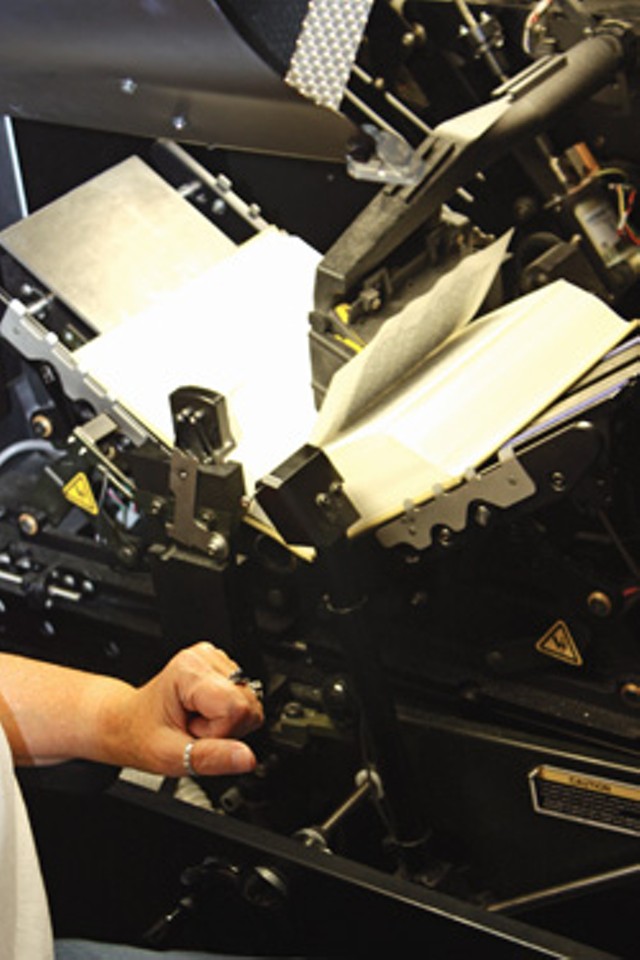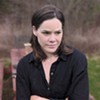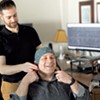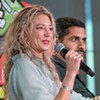Published September 29, 2010 at 9:41 a.m.
Tourists who make their way down Main Street in historic downtown Chester probably have no idea they’re in the presence one of the largest “banks” in America. It’s a modest, three-story white building at 397 Main with neatly tended gardens, flower-filled window boxes and a flagpole. What looks like a quaint bed-and-breakfast from the outside is actually a repository for tens of thousands of invaluable, and in some cases irreplaceable, assets.
This institution’s form of currency isn’t money, however, but words. NewsBank Inc. is the nation’s largest digital archiving service for the newspaper industry. Its on-site computers store 350 terabytes of information — that’s more than double the amount of data housed at the Library of Congress in Washington, D.C.
For 38 years, NewsBank has maintained a quiet but steady presence in southern Vermont. Each day, it archives the printed and online content of more than 2000 newspapers, magazines, wire services, business journals and other publications from around the globe — adding 1.2 million new articles to its database each month.
NewsBank also compiles and maintains the largest digital collection of early American newspapers, pamphlets and other printed materials. Some of it dates back to the 1600s.
It’s not surprising if most Vermonters have never heard of NewsBank. Most of its clients are out-of-state institutions such as publishing houses, libraries, government agencies, colleges, universities and large corporations. But if NewsBank itself isn’t a household word, many of its clients are. They include 20 of the 100 largest newspapers in the United States whose archives NewsBank maintains, among them the Washington Post, Chicago Tribune, Atlanta Journal-Constitution and Hartford Courant. Anyone who’s ever paid to download a story from one of their websites has dealt with NewsBank.
Though the newspaper industry is often described as a dinosaur that’s facing imminent extinction, NewsBank continually evolves to keep ahead of technological advances that might otherwise spell its own demise. In fact, the company has gone through so many transmutations over the last four decades that its chief operating officer, Michael Walker, says it feels like he’s worked for five different companies in his career.
“NewsBank’s culture has always been to look at threats as opportunities,” Walker explains during my recent visit to the Chester office. He was hired in 1986 by Readex Microprint, a newspaper archiving service that got its start by physically clipping, indexing and filing newspaper articles by hand. (Readex was purchased in 1983 by NewsBank’s current owner and president, Daniel Jones, and remains a division within the larger company.)
In the 1980s, NewsBank converted all its hard files to microfiche, which were then sold or leased to libraries and other institutions. Anyone old enough to have done library research using newspaper articles on microfiche was probably using a NewsBank product.
By 1992, NewsBank had transitioned its microform documents to searchable CD-ROMs, which were updated monthy.
In 1997, NewsBank’s world changed yet again with the advent of the Internet. Its databases have been online ever since, and the company continues to convert old documents of all formats — microforms, CD-ROMs, even fragile and historic printed materials and ephemera in special-reserve collections — into digital files.
Much of that digital conversion takes place in the Chester office, a surprisingly large facility that operates 24 hours a day, seven days a week. Looking at the place from the sidewalk, it’s hard to believe that 171 people work inside. (Privately owned and headquartered in Naples, Fla., NewsBank has 301 employees nationwide.)
From the main building, a hallway leads into a newer rear wing with a warren of hallways and offices. Lining the walls are framed clippings from centuries-old books discovered in Readex’s attic when the main house was renovated many years ago. They include illustrations of an 18th-century European estate and original covers of Life magazine, such as one that features the face of former Soviet leader Nikita Khrushchev.
In one office, about a half dozen employees sit at computer screens and convert printed books into digital files. Among them is Patsy Bohen, who operates an automatic book-scanning machine known as a Kirtas. The machine opens the book just enough to photograph each page, much the way a human reader would cradle a book, without flattening it and potentially damaging its spine.
After each page is photographed from above with a digital camera, a lever mounted with a tiny vacuum gently turns the page, while Bohen smoothes it out with her hand to ensure a clear image. On a good day, the Kirtas can scan 1200 pages an hour, Bohen says — if the books are in mint condition. Many, like this one from the U.S. Congressional Record, are not and take more time.
In a neighboring room, other NewsBank employees sit at large computer screens, converting microfilm and microfiche documents into digital documents. The day of my visit, an employee is scanning and reviewing transcripts from late-1960s radio shows that aired in India, Pakistan and Malaysia.
The transcripts come from the Foreign Broadcast Information Service. FBIS was a program launched in 1941 by what later became the Central Intelligence Agency. Between the ’40s and ’70s, FBIS monitored foreign broadcasts, then translated and transcribed them into English so that CIA experts could analyze them later for intelligence purposes.
Elsa Lamphere is the FBIS production supervisor who oversees NewsBank’s digital data conversion program. As she explains, the techs working on this project don’t just copy the documents. They also clean up the originals, adjusting the contrast and gray scale so that the company’s OCR, or optical character recognition software, can read each one. For the first time ever, these transcripts will be completely searchable by word, an invaluable resource for historians and other researchers.
At the center of the building the brains and central nervous system of NewsBank’s archival system: its main computer room. About 30 feet long and 15 feet wide, the room is super-cooled with a high-capacity air conditioner, with a control room walled off behind a glass window.
Manning the controls is Steve Osterlund, NewsBank’s vice president of systems engineering. Osterlund explains that this is the hub where the newspaper industry’s data arrive from all over the world. The company maintains similar facilities around the country in Boston, El Paso, Worchester, Mass., and Naples, Fla. With data the company’s lifeblood, multiple redundancies and off-site backup systems are key, he says. And, without the AC constantly blowing, the computer room would quickly heat up to more than 100 degrees.
Like many on staff, Osterlund has longevity with NewsBank — the average employee has been with the company for more than a decade; he’s been there for 15 years, and came from a professional background completely unrelated to the news industry.
In Osterlund’s case, he worked in the 1970s as an audio engineer in Detroit, recording such Motown stars as Stevie Wonder and Gladys Knight & the Pips. From there, he moved to Chicago and worked in motion-picture special effects, “the old kind, like in Star Wars, where you had models and motorized cameras,” he recalls.
Later, Osterlund relocated to Newport, R.I., where he helped the Navy develop submarine-launched Tomahawk cruise missiles. Next he moved to Springfield, Vt., and worked for a company that made computer-disc drives for NATO tanks. When that business packed up shop and left the state, Osterlund stayed behind.
One day, while walking down Main Street in Chester, he poked his head into NewsBank to see what the place was.
“For a year I lived a block away and didn’t even know they were here,” Osterlund recalls. “And when I walked in, there wasn’t even a job for me. They just sat me down and we started from scratch.”
Soon thereafter, Osterlund was teamed up with another employee, who could have been his Cold War counterpart in the former Soviet Union: Alex Odulo, a Russian computer expert whose previous experience included work on surface-to-air missiles. Together, the two men designed NewsBank’s vast computer system and have worked together ever since.
Dale Williamson, human resources director, says such stories are typical among NewsBank’s staff.
“That’s kind of how we operate,” he explains. “We see opportunities with people and we grab them.”
COO Walker agrees. He notes that NewsBank’s labor force has changed dramatically in the last 15 years. In 1997, about 50 percent of the company’s employees were entry level and relatively unskilled; today, that number is less than 15 percent.
In fact, Walker says that NewsBank is constantly looking for new workers whose skill sets are “right out there on the edge” of the latest technologies, especially those who are adept at managing tremendous amounts of digital data.
“We can’t advertise that we need someone with five to seven years experience, because, frequently, we’re looking for someone to work with something that just came out in the last two years,” Walker says.
Managing large-scale content, and finding people adept at doing it, continues to be a challenge, Walker adds, especially as the company expands its online offerings to reflect the ever-growing content of the newspaper industry, including audio and video files. Moreover, as the company expands internationally — NewsBank’s archives currently operate in Spanish and French, as well, with new languages on the way — its databases will continue to grow, creating demands for a variety of new skills.
While many companies pay lip service to the idea that their employees are their most valuable asset, Walker concludes, in the case of NewsBank, that’s a literal truth.
“When our employees walk out the door every night, some of them walk out with knowledge that nobody else has here,” he says. And that kind of information is much harder to back up.
More By This Author
Speaking of Media,
-

Media Note: Stewart Ledbetter to Retire After 40-Year News Career
Jan 29, 2024 -

Media Note: VTDigger Recognizes Newsroom Union
Apr 29, 2020 -

Media Note: 1,100 'Super Readers' Donate to Seven Days
Mar 31, 2020 -

Media Note: Online News Startup HereCast to Shut Down
Nov 29, 2019 -

Media Note: VPR Fires 'Vermont Edition' Producer Ric Cengeri
Oct 11, 2019 - More »
Comments
Comments are closed.
From 2014-2020, Seven Days allowed readers to comment on all stories posted on our website. While we've appreciated the suggestions and insights, right now Seven Days is prioritizing our core mission — producing high-quality, responsible local journalism — over moderating online debates between readers.
To criticize, correct or praise our reporting, please send us a letter to the editor or send us a tip. We’ll check it out and report the results.
Online comments may return when we have better tech tools for managing them. Thanks for reading.













































